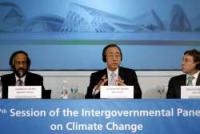A panel of UN scientists has fired an opening salvo for world political leaders meeting next month in Bali to negotiate a successor to the Kyoto protocol.
And it’s a stern warning of what’s at stake if governments fail to take action, far stronger than three previous IPCC reports despite lively debate – highlighted by objections from the U.S., China and India – among about 130 governments who gave final approval.
The 26-page report by the Nobel Peace Prize-winning Intergovernmental Panel on Climate Change said warming of the climate system is “unequivocal” and governments must take action to avoid catastrophic consequences.
Governments were told that they only have a few years to avoid the “abrupt and irreversible” affects of global warming. The summit, held in Spain, heard there’s still time to act – but not much.
Barring action, the report said, melting ice sheets would lead to a rapid rise in sea levels and the extinction of large numbers of species would be brought about by even moderate warming on the order of 1 to 3 degrees.
The report is the final word from the UN climate panel before leaders meet in Bali, Indonesia, next month to discuss a treaty that will replace Kyoto, which expires in 2012. It is also the first report from the panel since it was awarded the Nobel prize in October, which many scientists say emboldened them to take stronger positions.
Secretary General Ban Ki-moon, describing climate change as “the defining challenge of our age,” called on the U.S. and China to play “a more constructive role.” Both are signatories to Kyoto, but Washington has not ratified the treaty and China, along with India and other developing countries, is not bound by its mandatory emissions caps.
Though more alarming than its predecessors, some believe the report still understates the trajectory of global warming and its impact. The I.P.C.C.’s scientific process, which takes five years of study and writing from start to finish, cannot take into account the very latest data on climate change or economic trends, which show larger than predicted development and energy use in China.
Subscribe to our newsletter
Stay up to date with DeSmog news and alerts







